新概念英语第一册第73课Lesson73课文单词知识点
- 格式:doc
- 大小:83.00 KB
- 文档页数:2
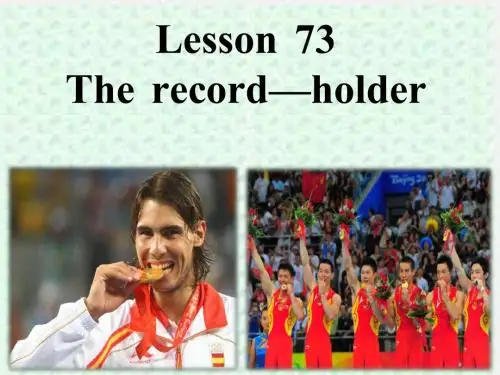
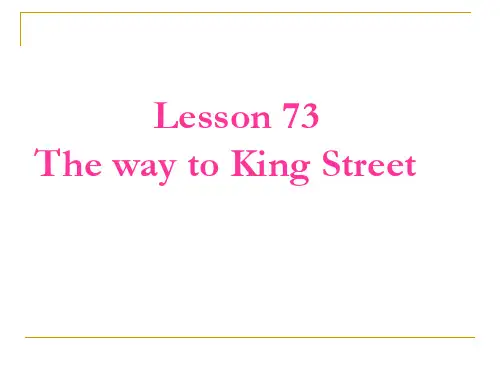
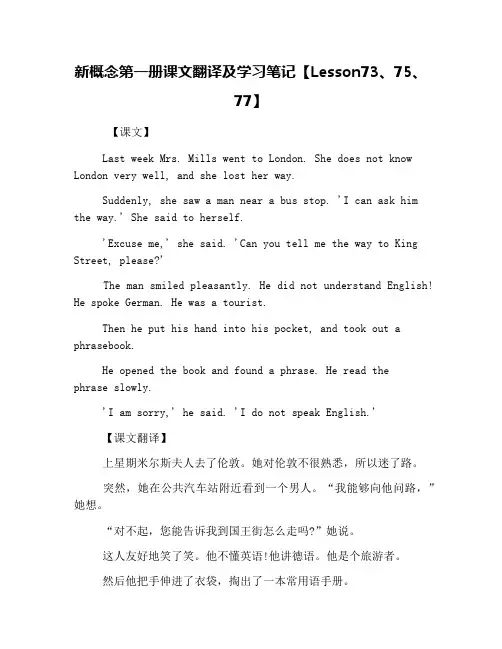
新概念第一册课文翻译及学习笔记【Lesson73、75、77】【课文】Last week Mrs. Mills went to London. She does not know London very well, and she lost her way.Suddenly, she saw a man near a bus stop. 'I can ask him the way.' She said to herself.'Excuse me,' she said. 'Can you tell me the way to King Street, please?'The man smiled pleasantly. He did not understand English! He spoke German. He was a tourist.Then he put his hand into his pocket, and took out a phrasebook.He opened the book and found a phrase. He read thephrase slowly.'I am sorry,' he said. 'I do not speak English.'【课文翻译】上星期米尔斯夫人去了伦敦。
她对伦敦不很熟悉,所以迷了路。
突然,她在公共汽车站附近看到一个男人。
“我能够向他问路,”她想。
“对不起,您能告诉我到国王街怎么走吗?”她说。
这人友好地笑了笑。
他不懂英语!他讲德语。
他是个旅游者。
然后他把手伸进了衣袋,掏出了一本常用语手册。
他翻开书找到了一条短语。
他缓慢地读着短语。
“很抱歉,” 他说,“我不会讲英语。
”【生词】week n. 周London n. 伦敦suddenly adv. 突然地bus stop 公共汽车站smile v. 微笑pleasantly adv. 愉快地understand (understood ) v. 懂,明白speak (spoke ) v. 讲,说hand n. 手pocket n. 衣袋phrasebook n. 短语手册,常用语手册phrase n. 短语slowly adv. 缓慢地【知识点讲解】在新概念一的课本里,73课前面有一个小测试,有书的同学能够自己做一下检验一下学到现在的水平。
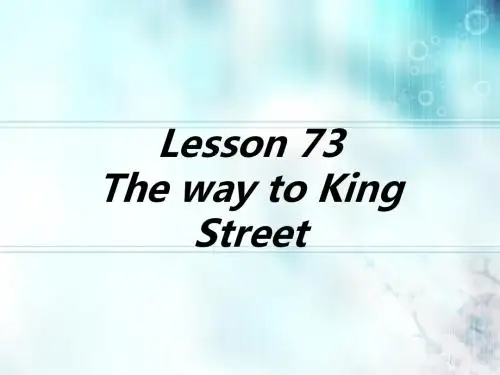
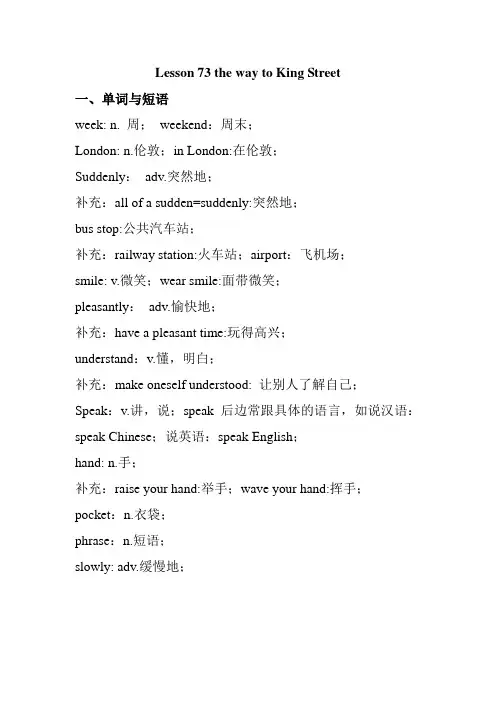
Lesson 73 the way to King Street一、单词与短语week: n. 周;weekend:周末;London: n.伦敦;in London:在伦敦;Suddenly:adv.突然地;补充:all of a sudden=suddenly:突然地;bus stop:公共汽车站;补充:railway station:火车站;airport:飞机场;smile: v.微笑;wear smile:面带微笑;pleasantly:adv.愉快地;补充:have a pleasant time:玩得高兴;understand:v.懂,明白;补充:make oneself understood: 让别人了解自己;Speak:v.讲,说;speak后边常跟具体的语言,如说汉语:speak Chinese;说英语:speak English;hand: n.手;补充:raise your hand:举手;wave your hand:挥手;pocket:n.衣袋;phrase:n.短语;slowly: adv.缓慢地;二、短语、句型及语法1、She does not know London very well, and she lost her way.他对伦敦不很熟悉,因此迷了路;在本句中有两个知识点需要引起注意:①know、、、well:对、、、了解,例:I know him very well.我非常了解他;I do not know the book very well.我对这本书不是很了解。
②关于与way相关的几个重要短语:lose one′s way: 迷路;I lost my way yesterday:昨天我迷路了;on the way to、、、在去、、、的路上;例:Tom is on the way to school now.汤姆现在正在去学校的路上。
by the way:顺便提一下,顺便问一下,例:By the way, I have something to tell you.我顺便有些事情想告诉你。
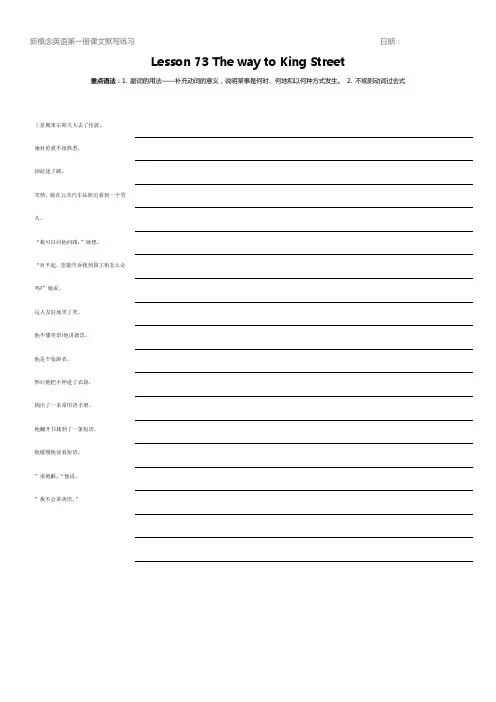
Lesson 73 The way to King Street重点语法:1. 副词的用法——补充动词的意义,说明某事是何时、何地和以何种方式发生。
2. 不规则动词过去式上星期米尔斯夫人去了伦敦。
她对伦敦不很熟悉,因此迷了路。
突然,她在公共汽车站附近看到一个男人。
“我可以向他问路,”她想。
“对不起,您能告诉我到国王街怎么走吗?”她说。
这人友好地笑了笑。
他不懂英语!他讲德语。
他是个旅游者。
然后他把手伸进了衣袋,掏出了一本常用语手册。
他翻开书找到了一条短语。
他缓慢地读着短语。
”很抱歉,“他说,”我不会讲英语。
”Lesson 75 Uncomfortable shoes重点语法:一般过去时与时间短语。
一般过去时通常与表示确切过去时间的短语连用。
女士:像这样的鞋子你们有吗?售货员:什么尺码的?女士:5号的。
售货员:什么颜色?女士:黑的售货员:对不起,我们没有。
女士:但是,我姐姐上个月买到了这样的一双。
售货员:她是在这儿买的吗?女士:不。
她是在美国买的。
售货员:一个月前我们有这要的鞋。
但是现在没有了。
女士:您能为我找一双吗?售货员:恐怕不行。
这鞋在去年和前年时兴.而今年已不流行了。
售货员:现在流行的是这种鞋子。
女士:这种鞋子看上去很不舒适。
售货员:的确很不舒适。
可是女人们总是穿不舒适的鞋子!Lesson 77 Terrible toothache重点语法:否定疑问句。
否定疑问句用来表示惊异、责难或赞叹,也可以表达某种建议、邀请、请求或看法。
护士:早上好,克罗夫特先生。
克罗夫特先生:早上好,护士。
我想见牙科医生。
护士:您约好了吗?克罗夫特先生:没有。
护士:急吗?克罗夫特先生:是的,很急。
我难受极了,牙痛得要命。
护士:您在4月24日星期一上午10点钟来行吗?克罗夫特先生:我必须现在就见牙科医生,护士。
护士:牙科医生这会儿很忙。
您下午两点钟来行吗?克罗夫特先生:那就太晚了。
牙科医生现在就不能给我看一下吗?护士:恐怕不能,克罗夫特先生。
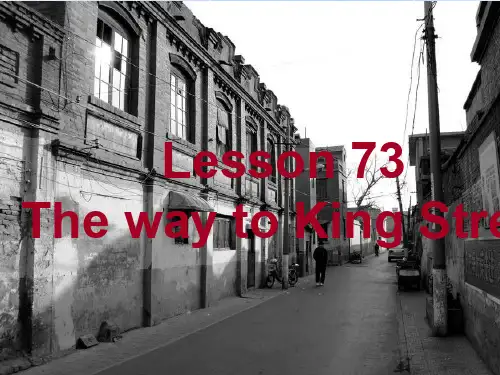
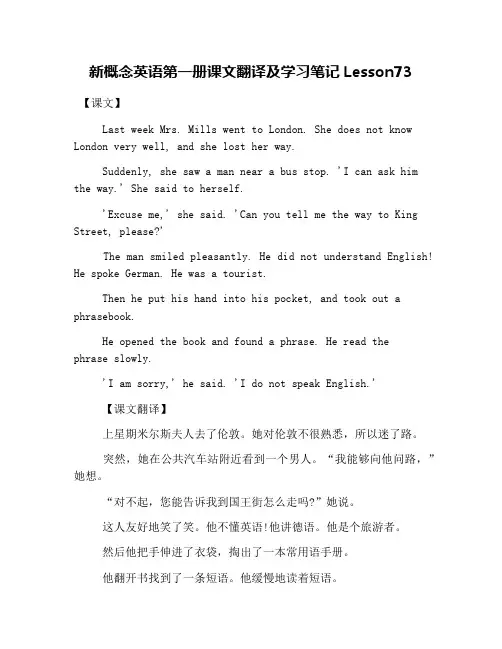
新概念英语第一册课文翻译及学习笔记Lesson73【课文】Last week Mrs. Mills went to London. She does not know London very well, and she lost her way.Suddenly, she saw a man near a bus stop. 'I can ask him the way.' She said to herself.'Excuse me,' she said. 'Can you tell me the way to King Street, please?'The man smiled pleasantly. He did not understand English! He spoke German. He was a tourist.Then he put his hand into his pocket, and took out a phrasebook.He opened the book and found a phrase. He read thephrase slowly.'I am sorry,' he said. 'I do not speak English.'【课文翻译】上星期米尔斯夫人去了伦敦。
她对伦敦不很熟悉,所以迷了路。
突然,她在公共汽车站附近看到一个男人。
“我能够向他问路,”她想。
“对不起,您能告诉我到国王街怎么走吗?”她说。
这人友好地笑了笑。
他不懂英语!他讲德语。
他是个旅游者。
然后他把手伸进了衣袋,掏出了一本常用语手册。
他翻开书找到了一条短语。
他缓慢地读着短语。
“很抱歉,” 他说,“我不会讲英语。
”【生词】week n. 周London n. 伦敦suddenly adv. 突然地bus stop 公共汽车站smile v. 微笑pleasantly adv. 愉快地understand (understood ) v. 懂,明白speak (spoke ) v. 讲,说hand n. 手pocket n. 衣袋phrasebook n. 短语手册,常用语手册phrase n. 短语slowly adv. 缓慢地【知识点讲解】在新概念一的课本里,73课前面有一个小测试,有书的同学能够自己做一下检验一下学到现在的水平。
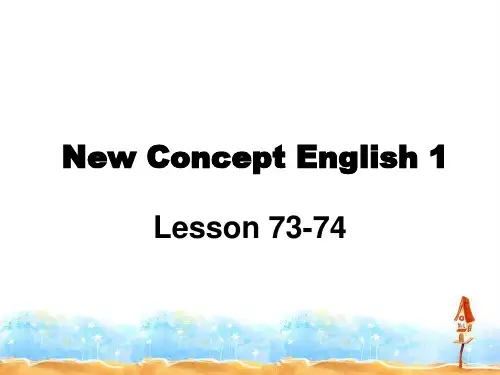
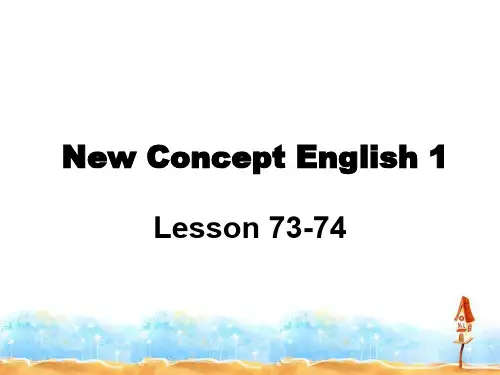
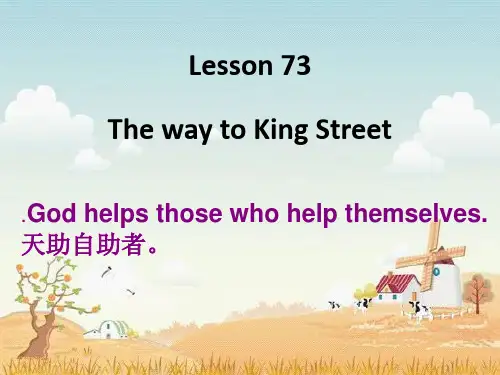
Lessen 73 The way to King Street 到国王街的走法单词详解:1)weekday n. 平日,工作日(星期一至星期五)on weekdays 在平日,在工作日weekend n. 周末(星期五晚上至星期日晚上)at weekends 在周末2) weekly1) adj. 每周一次的a weekly wage 周薪2)adv. 每周一次地=once a weekI go to the swimming pool weekly. 我每周去一次游泳馆。
1)I come from London.我来自于伦敦.What’s the climate like in London?伦敦的天气怎么样?We arrived in London yesterday. 我昨天到达伦敦.He suddenly came in. 他突然进来了。
at the bus stop 在公共汽车站I often see him at the bus stop. 我经常在公共汽车站见到他。
(一般小地方都用at 这个介词来修饰),如:at the railway station 在火车站at the airport 在飞机场1) vi. 微笑(注意smile 与smell发音的区别)I smiled at the children 我对孩子们微笑了下。
2)n. 微笑give sb a friendly smile 对某人友好地微笑区分:laugh 出声的笑,大笑He always laughs loudly. 他总是大声地笑。
laugh at…嘲笑某人Don’t laugh at others.He smiled pleasantly. 他亲切地微笑pleasant adj. The climate here is very pleasant.这里的天气非常舒服例句1:The book is very hard to understand. 这本书很难懂。
新概念第一册73课★week n. 周this week, last week等,前面不能加介词the week before last 上上周the week after next 下下周★suddenly 既可以放在句首,也可以放在句中或句末。
I suddenly remembered that I didn't bring my key.★smile n. &v. 笑Look, she is smiling at me. She had a warm smile on her face.smile a…smile She smiled a pleasant smile=She smiled pleasantly她愉快地笑了★hand n. 手v .交出,传递•give sb. a (big) hand 帮助某人•on the one hand 一方面•on the other hand 另一方面•hand in hand 手拉手•hand in 上交交付•hand over to移交给★lose v. (使)迷路,遗失,失去(lost—lost)•lose one’s way 迷路•lose sight of 看不见•lose heart失去信心,泄气•lose weight减肥•lose oneself in沉迷于,专心于•be lost in 迷恋于,专心于★speak-spoke-spoken 说某种语言speak English•frankly/generally/strictly/eaxactly speaking坦率/一般/严格/确切地说•speak ill/badly/well/highly of 说…坏/好话认为…坏/好讲解1.She does not know London very well, and she lost her way.and 此处指的是“因此,所以”Come upstairs and see it. 这里的and指的是“目的”•know …well 对……了解我对他不是很了解。
Lesson 73 单词讲解1. week: 周这周:this week上周:last week下周:next week2. London: 伦敦London is the capital city of Britain.3. suddenly: 突然地4. bus stop: 公共汽车停靠站bus station: 公共汽车总站5. smile: 微笑laugh: 大笑v./ n.He said and smiled.She is telling me a story with a smile.They are talking and laughing.6. pleasantly: 愉快地7. understand: 懂得、明白understand- understood8. speak: 讲话、说话speak-spokesay: 讲话、说话say-saidspeak: A. 说话的能力;B. 语言。
say: 说话的内容。
对某人说: say to sb. \ speak to sb.1) It's very cloudy now. But the radio ___it’s going to be sunny this afternoon.A. speaksB. tellsC. talksD. says2) He is super. He can ___ English, French and Chinese.A. sayB. speakC. talkD. tell3) Please______ hello to your mom.A. sayB. speakC. talkD. tell9. hand: 手a green hand: 新手10. pocket: 衣袋pocket money: 零用钱He put his hands into his pockets.11. phrase: 短语phrasebook: 短语手册12. slowly: 缓慢地Lesson 73 课文讲解1. went to - lost her way- saw- said- smiled- did not- spoke-was- put- took- opened- found- readgo to- went tolose her way- lost her waysee- sawsay-saidsmile- smileddo not- did not2. She does not know … very well.她对…不是很了解。
【知识点讲解】
1. 今天还是继续熟悉一般过去式。
我们看到在课文一开始就用Last week 来点明事件发生的
时间,把整个语境都摆到了过去的状态里。
有同学可能会问:那第二句也用到 She does not know London very well... 这里也是一般现在时态啊!我们要注意的是,这里说“米尔斯夫人不熟悉伦敦”是一个持续的状态,不是说米尔斯夫人在上周才不熟悉伦敦,而是她一直以来都不熟悉,所以这里前半句用的是一般现在时态,紧跟着的一句“she lost her way ” 又回到一般过去式了。
,
2. 还是第二句中“...and she lost her way.” 这里我们看到中文的翻译是“所以她迷路了”。
这并不是说and 的意思可以是“所以”,and 还是“以及、和”的意思,这里只是用中文惯式的连词“所以”来翻译了这个意思而已。
3. 今天又学到了两个不规则的动词过去变化,大家要特别记忆一下:speak -
Lesson73
Last week Mrs. Mills went to London. She does not know London very well, and she lost her way.
Suddenly, she saw a man near a bus stop. 'I can ask him the way.' She said to herself.
'Excuse me,' she said. 'Can you tell me the way to King Street, please'
The man smiled pleasantly. He did not understand English! He spoke German. He was a tourist.
Then he put his hand into his pocket, and took out a phrasebook.
He opened the book and found a phrase. He read the phrase slowly.
'I am sorry,' he said. 'I do not speak English.' 上星期米尔斯夫人去了伦敦。
她对伦敦不很熟悉,因此迷了路。
突然,她在公共汽车站附近看到一个男人。
“我可以向他问路,”她想。
~
“对不起,您能告诉我到国王街怎么走吗”她说。
这人友好地笑了笑。
他不懂英语!他讲德语。
他是个旅游者。
然后他把手伸进了衣袋,掏出了一本常用语手册。
他翻开书找到了一条短语。
他缓慢地读着短语。
“很抱歉,” 他说,“我不会讲英语。
”
spoke;understand - understood。
另外再顺便记一个:stand - stood,站立。